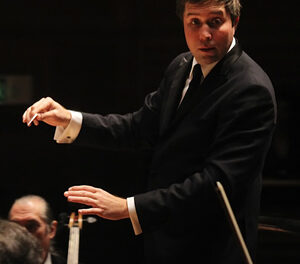Something really magical happens when human voices blend in rich close harmony, sustained or subtly shifting, supporting and uplifting a well-chosen text. Bruno Walter pointed out in a lecture “On the Moral Strength of Music” how performer and listener alike are drawn into community by the mystical power of harmony. He said, “I often think I can feel the way we are seized by its magical power of transformation and experience a kind of mystic merging, blending with it and becoming one.” It is my belief that those who heard the Concert Singers of Cary in Westwood Baptist Church on November 20 experienced something of this transforming community through becoming one with the music. The selections, chosen for the program by Lawrence Speakman, the CSC’s director since 1991, were written mostly in the past fifteen or so years. These creative composers represent some of the best choral music around today and offer a still richer future for lovers of this idiom – performers and listeners alike. Though the choir struggled a bit with finding or holding the right pitches in some of the more challenging passages, and though the orchestra members muffed a few passages, overall it was a very special concert.
The first half of the program began with pieces by Robert H. Young, now retired but as an octogenarian continuing an active schedule as Choirmaster at St. Paul’s Episcopal Church in Waco, Wake Forest University Composer-in-Residence Daniel Gawthrop, and Grammy nominee Eric Whitacre. The three selections – Young’s “Sudden Light,” Gawthrop’s “Sing Me to Heaven,” and Whitacre’s “Lux Aurumque” – are cut from the same choral fabric – they are rich and accessible – and each was very well done by the 36-voice Chamber Choir. There was a sense that the audience was truly drawn into the performance. The Whitacre composition especially declares to the world an uncanny sense of vocal possibilities in choral sound that is at once elegant and transcendent.
Stephen Paulus’s four-movement A Place of Hope was commissioned by the Mayo clinic for the dedication of a new addition to the hospital. It makes use of texts extracted from heartfelt letters and notes written by Mayo Clinic patients. It is a beautiful idea, and though the composition sounds rather forced in places, it comes out okay. It was nicely done by the Chamber choir, and accompanist Linda Velto deserves special kudos.
After intermission, the CSC’s full 120-voice choir presented two more late-20th-century choral masterpieces, René Clausen’s “Set Me As a Seal” and James Mulholland’s setting of “A Red, Red Rose.” Both were well done and kept the audience involved in the community of music.
The featured piece was Morten Lauridsen’s “Lux Aeterna,” composed in 1997 and premiered by the Los Angeles Master Chorale, for whom it was written. It takes its text from the portion of the Latin Mass for the Dead that begins “Grant them eternal rest, O Lord, and let perpetual light shine upon them.” For this performance, the Concert Singers were joined by members of the Raleigh Symphony Orchestra. Those familiar with Lauridsen’s “Dirait-on” and “O Magnum Mysterium” will know the style, for “Lux Aeterna” has the same rich choral sound, characterized by well-crafted delicious dissonances melting into sweet resolution and long-sustained melodic lines with a sense of direction and purpose, enhanced by the added lush and support of a symphony orchestra. All together, it added up to a marvelously contemplative experience on the weekend before Thanksgiving, leading us to give thanks for our food and our material “blessings” (which are beyond the imagination of even the previous generation), our families – those present and those missing – and finally to contemplate, with the help of music, what it means to be human in our time.











